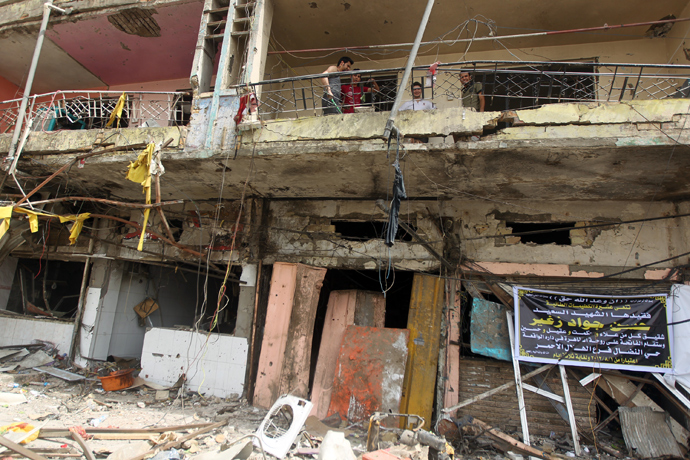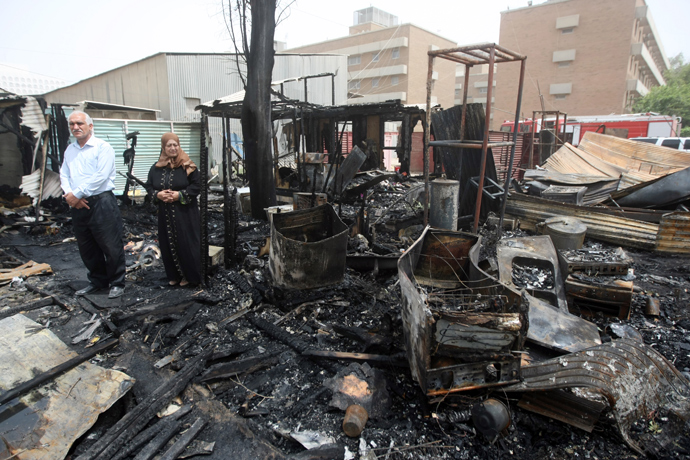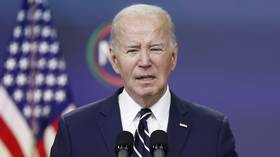Iraq poll, democratic future shattered by violence’
The intensified violence across Iraq, which has seen a wave of deadly bombings and attacks on politicians in the run-up to next month’s election, is endemic to the societal collapse caused by the US-led war, former MI5 agent Annie Machon told RT.
At least 19 people were killed and more than 130 wounded after
bomb blasts rocked four Shiite mosques in the Iraqi capital of
Baghdad and another mosque in Kirkuk on Friday. The latest attacks
come amidst a recent spike in violence, which has resulted in an
estimated 260 deaths for the month of March alone.
Meanwhile, as Iraq prepares to hold its first parliamentary
elections in three years, politicians have increasingly become the
victims of targeted assassinations. Following the latest bomb
attack on Tuesday in the town of Tuz Khurmatu – which killed two
candidates and their bodyguard – the total number of politicians
killed in the run-up to Iraq’s April 20 parliamentary elections now
stands at 11.
Machon argues the increased bloodshed does not bode well for Iraq’s
democratic future, as the effects of war continue to ripple across
the country.
RT:Attacks like this have been intensifying recently.
What's the endgame here?
Annie Machon: I’m not even sure if there is an endgame.
Unfortunately, by the West intervening in Iraq in an illegal war 10
years ago, we’ve now seen a massive destabilization of the old
structures and no real meaningful new structures put in place. So
it’s not just the politicians who are under threat, but vast
sections of other areas of society too. So although Saddam
[Hussein] was an odious dictator, for the vast majority of people
under him, he did provide stability, and since he was removed, they
have lost that stability, as well as losing most of the basic
infrastructure which kept their society running.
I mean just things like proper hospitals, schools, even just water
and sewage [systems] and things like that have been decimated and
not rebuilt following the American and Western intervention. Of
course, this has led to social destabilization, as well as health
and education issues; there was a cholera outbreak a few years ago.
So the country has been wrecked really by the Western
intervention.

RT:Now these killings, we’ve had over 245 just this
month, they’re targeting local people, they’re targeting
politicians, who’s actually to gain from all the killings?
AM: That’s a very good question. I mean, you had a piece
about Syria just before this and you can look at any of the other
Western interventions as well in Middle Eastern countries. It
allows an incursion by security companies and security forces from
the West which can be very good for big business for Western
companies which provide that security. It can also mean that
instability allows the resources of that country to flow out of
that country with little oversight. But for the people that live
there, it’s become very, very difficult.
I would say though that casting back, I think it very ironic that
the West intervened to provide democracy, freedom to the Iraqi
people and yet the West intervened in a highly undemocratic and
totally illegal way. It was a done deal cooked up between George
Bush and Tony Blair 11 year ago which was then forced through our
Western democratic systems with no say-so. I mean, many millions of
us marched against the incursion into Iraq and yet it went ahead.
So for countries that take an illegal step, an illegal decision to
go to war against Iraq in an undemocratic way, to then justify it
as giving democracy to Iraq I think is flagrant hypocrisy.
RT:There are almost 21,000 candidates competing now in
this upcoming election in April. Can we not take that as a good
sign that democracy is taking root? Isn’t that what they wanted for
the country?
AM: Well, it depends how you define democracy. It’s great
that people are stepping forward and they want to represent their
constituencies, but if you can’t guarantee that democracy will be
democratically elected, if you can’t guarantee that people are not
afraid to go and vote, if you can’t guarantee that there won’t be
oppression and violence around that process, and if you can’t
guarantee that the people who are elected will have real powers to
represent their constituencies, then it’s not a real democracy;
it’s yet another oligarchy, another dictatorship imposed on the
hapless people.

The statements, views and opinions expressed in this column are solely those of the author and do not necessarily represent those of RT.












